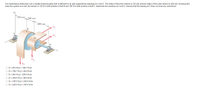
Elements Of Electromagnetics
7th Edition
ISBN: 9780190698614
Author: Sadiku, Matthew N. O.
Publisher: Oxford University Press
expand_more
expand_more
format_list_bulleted
Question

Transcribed Image Text:Two transmission belts pass over a double-sheaved pulley that is attached to an axle supported by bearings at A and D. The radius of the inner sheave is 125 mm and the radius of the outer sheave is 250 mm. Knowing that
when the system is at rest, the tension is 120 N in both portions of belt B and 180 N in both portions of belt C, determine the reactions at A and D. Assume that the bearing at D does not exert any axial thrust.
150 mm
100 mm
200 mm
Tc
T'.
T'B
OD= (60.0 N) j + (166.7 N) k
OD = (166.7 N) j + (60.0 N) k
O D = (80.0 N) j+ (200.0 N) k
OD = (200.0 N) j + (80.0 N) k
O D = (100.0 N) j + (240.0 N) k
OD = (240.0 N) j+ (100.0 N) k
Expert Solution
This question has been solved!
Explore an expertly crafted, step-by-step solution for a thorough understanding of key concepts.
Step by stepSolved in 2 steps with 2 images

Knowledge Booster
Learn more about
Need a deep-dive on the concept behind this application? Look no further. Learn more about this topic, mechanical-engineering and related others by exploring similar questions and additional content below.Similar questions
- The beam shown is supported by a pin at A and rope BDE as shown. Knowing that L = 1.5 m and that the mass suspended from C is 31 kg, determine the tension in rope BDE and the reactions at A. Enter the magnitude of the tension in rope BDE below, in N to the nearest whole N. (Take g = 9.81 m/s²) 2 m B m E Marrow_forward2.The lever BCD is hinged at C and is attached to a control rod at B. If P = 200 N, determine (a) the tension in rod AB, (b) the reaction at C. D 75 mm 90° 30 mm B 40 mmarrow_forwardD A₂ 4 m || D B The A-frame shown supports a 500 N force D at the midpoint of member AB as shown. Ay 4 m Determine the scalar components of the reactions at pins A and C. Note: the sign of a scalar component indicates the sense of the force. A positive sense indicates the force points towards the positive end of the corresponding axis. 6 m C₂ Cy ||arrow_forward
- The press shown is used to emboss a small seal at E. Knowing that the vertical component of the force exerted on the seal must be 900 N, determine (a) the required vertical force P,(b) the corresponding reaction at A.arrow_forwardP24-2. A 12-m pole supports a horizontal cable CD and is held by a ball and socket at A and two cables BE and BF. Knowing that the tension in cable CD is 14 kN and assuming that CD forms an angle = 25° with the vertical xy plane, determine the tension in cables BE and BF and the reaction at A. D 12 m O 8 m 7.5 m, y A C B E 6 m F 6 marrow_forward4. Determine reactions at A and D of the frame shown. y 4 kN/m 4 kN/m в 1.5 m 2 m 10 kN-m 20 kN 3 m 4m-arrow_forward
- 1. Determine the reactions at the ball-and- sockets joint D, and the tension in cables Ab and AC. В 3 m 6 m 2 m D A 30° 400 Narrow_forwardDetermine the components of the force of reaction at point A (F ax, F ay, MA ). Assume that the positive x and y axes are directed to the right and upward, respectively and that positive moments act counterclockwise.arrow_forwardKnowing the tension in cable AC is 795 N, determine the components of the force exerted by the cable on the support at A. in this problem. The wooden board will not be in your FBD.) (Note: Our FBDS are focused on points not objects. Your FBD should show the “special points" 400 mm 450 mm 600 mm B D C 600 mmarrow_forward
arrow_back_ios
arrow_forward_ios
Recommended textbooks for you
 Elements Of ElectromagneticsMechanical EngineeringISBN:9780190698614Author:Sadiku, Matthew N. O.Publisher:Oxford University Press
Elements Of ElectromagneticsMechanical EngineeringISBN:9780190698614Author:Sadiku, Matthew N. O.Publisher:Oxford University Press Mechanics of Materials (10th Edition)Mechanical EngineeringISBN:9780134319650Author:Russell C. HibbelerPublisher:PEARSON
Mechanics of Materials (10th Edition)Mechanical EngineeringISBN:9780134319650Author:Russell C. HibbelerPublisher:PEARSON Thermodynamics: An Engineering ApproachMechanical EngineeringISBN:9781259822674Author:Yunus A. Cengel Dr., Michael A. BolesPublisher:McGraw-Hill Education
Thermodynamics: An Engineering ApproachMechanical EngineeringISBN:9781259822674Author:Yunus A. Cengel Dr., Michael A. BolesPublisher:McGraw-Hill Education Control Systems EngineeringMechanical EngineeringISBN:9781118170519Author:Norman S. NisePublisher:WILEY
Control Systems EngineeringMechanical EngineeringISBN:9781118170519Author:Norman S. NisePublisher:WILEY Mechanics of Materials (MindTap Course List)Mechanical EngineeringISBN:9781337093347Author:Barry J. Goodno, James M. GerePublisher:Cengage Learning
Mechanics of Materials (MindTap Course List)Mechanical EngineeringISBN:9781337093347Author:Barry J. Goodno, James M. GerePublisher:Cengage Learning Engineering Mechanics: StaticsMechanical EngineeringISBN:9781118807330Author:James L. Meriam, L. G. Kraige, J. N. BoltonPublisher:WILEY
Engineering Mechanics: StaticsMechanical EngineeringISBN:9781118807330Author:James L. Meriam, L. G. Kraige, J. N. BoltonPublisher:WILEY

Elements Of Electromagnetics
Mechanical Engineering
ISBN:9780190698614
Author:Sadiku, Matthew N. O.
Publisher:Oxford University Press

Mechanics of Materials (10th Edition)
Mechanical Engineering
ISBN:9780134319650
Author:Russell C. Hibbeler
Publisher:PEARSON

Thermodynamics: An Engineering Approach
Mechanical Engineering
ISBN:9781259822674
Author:Yunus A. Cengel Dr., Michael A. Boles
Publisher:McGraw-Hill Education

Control Systems Engineering
Mechanical Engineering
ISBN:9781118170519
Author:Norman S. Nise
Publisher:WILEY

Mechanics of Materials (MindTap Course List)
Mechanical Engineering
ISBN:9781337093347
Author:Barry J. Goodno, James M. Gere
Publisher:Cengage Learning

Engineering Mechanics: Statics
Mechanical Engineering
ISBN:9781118807330
Author:James L. Meriam, L. G. Kraige, J. N. Bolton
Publisher:WILEY